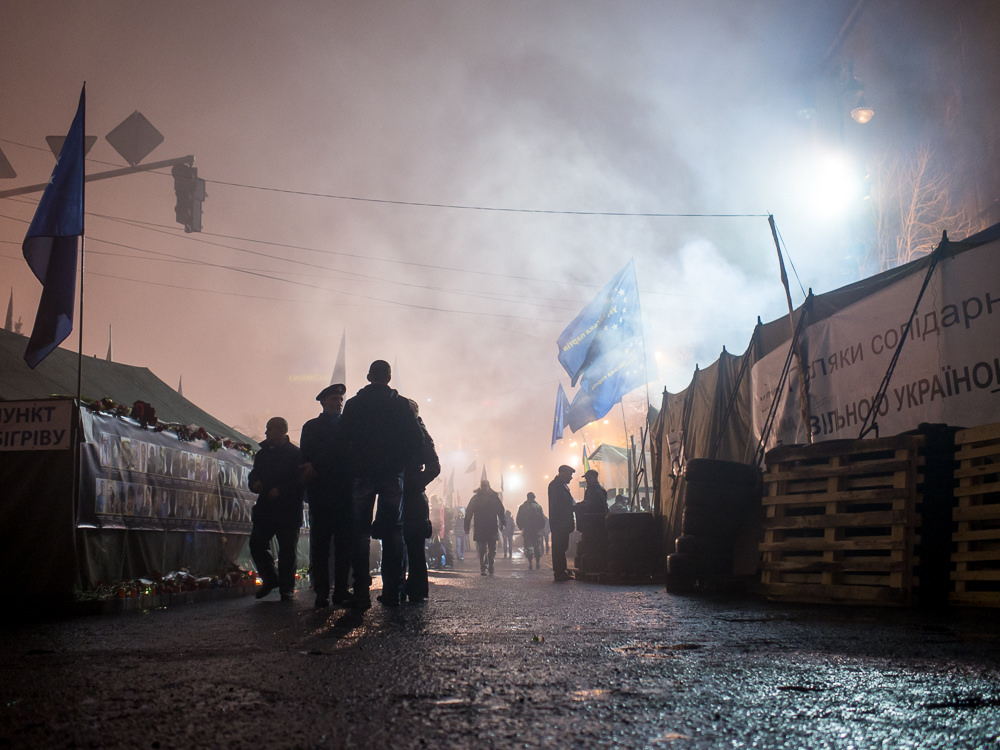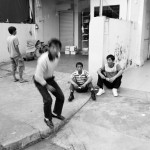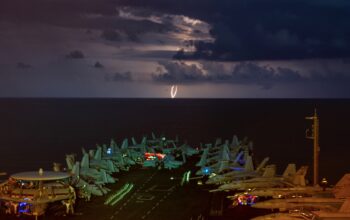Ukraine, and all of Europe, has been on edge for the last months as student protests which started in November of 2013 turned into violent conflicts in January of 2014. Having interviewed a Ukrainian student, Dima Kharchenko, who had been taken part in the revolution.
“I do not know where to start. It seems like so much has happened in the past couple of months. Firstly, I would like briefly touch on what preceded the revolution. The disagreements originate from 2010 when Yanukovych was elected as the president with previous vote falsifications, especially in the East, closer to the Russian border. After he was declared the president, Yanukovych launched a bunch of new policies, which were generally aimed at recreating the state where the majority of people served directly under the President and those beside him – including his so called “family”. Consequently, these policies led to the spread of deep corruption within the system and the worsening of human rights During the process of adapting the new policies, the citizens became unsatisfied with his rule, for reasons including his ignorance of public opinion.
However, Yanukovych tried to gather support by maintaining the Euro-integration process between Ukraine and the EU, which is an idea that appears to be popular in Ukraine. Throughout 2013, Yanukovych traded both with Russia and the EU, changing sides whenever one supported Ukraine more than the other. In the end, Putin persuaded Yanukovych to delay signing the Association Agreement (EU AA) with the EU on November 21st. This long feared decision led to peaceful student protests in Kiev, especially in the Independence Square, which is also known as the Maidan 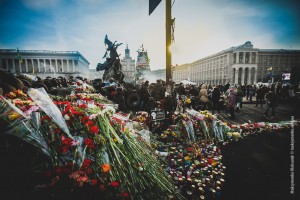 Nezalezhnosti. The protestors demanded that Yanukovych sign the deal with the EU despite Russia’s reluctancy. Since the protestors were advocating the signing of the EU AA deal, they renamed the place to “EuroMaidan”. When it was clear that the agreement would not be signed after all, people started to go home. The night before EuroMaidan was to be disbanded, the Ukrainian special riot police, Berkut, attacked the protesters and journalists, severely beating them near and around Maidan. This is said to be the turning point which transformed the countrywide peaceful protests against the current government, to violent clashes between the government forces and the opposition.
Nezalezhnosti. The protestors demanded that Yanukovych sign the deal with the EU despite Russia’s reluctancy. Since the protestors were advocating the signing of the EU AA deal, they renamed the place to “EuroMaidan”. When it was clear that the agreement would not be signed after all, people started to go home. The night before EuroMaidan was to be disbanded, the Ukrainian special riot police, Berkut, attacked the protesters and journalists, severely beating them near and around Maidan. This is said to be the turning point which transformed the countrywide peaceful protests against the current government, to violent clashes between the government forces and the opposition.
As an outsider, a fact that has not been widely discussed in the international media, is that Yanukovych is a previously convicted criminal who has been imprisoned twice. The decisions led by him to attack the protestors and later not allowing flexibility in negotiations thus show such methods are perceived as justified and routine for this ex-con. His war-crime-like actions further decreased his credibility and the legitimacy of his power in the eyes of the international community, and dug himself a deeper grave. Even though Ukraine is not a fully democratic country, due to corruption, and it holds close bonds with Russian and Belarussian regimes, such open violence against peaceful demonstrators is simply unacceptable by the society and cannot be justified by any means.
Briefly, people of Ukraine are fighting against the authorities which have continuously, for three years, oppressed the population through deliberately ineffective government and structural violence. Even though the Western media says people are solely fighting for further EU integration, it is a false assumption. EU integration seemed like an open door to a democratised Ukraine, which was closed by Yanukovych and sparked violence. People are struggling because they are fed up with the government and its ineffective actions.
The issue in Ukraine has been called many names, such as Eurorevolution, Revolution of Dignity, and the Euromaidan revolution. I like the sound of the Revolution of Dignity most, since we are fighting for our basic citizen rights over the dictator rule. Living through these events, I have come to think that, at times, further happiness can be achieved just through collective struggle. Even though the clashes that are ongoing and create a dreadful atmosphere, many people are happy to be there. People are demonstratingbecause they are willing to fight, not because they are forced to. Maidan looks catastrophic and depressive today, but people attending seem happy and help out with whatever they are capable of. It is difficult to acknowledge and realise that all the things happening here are happening to my country and its people. It is especially hard to realise the fact that people are dying for a better future, because of a student revolution that started so peacefully.
And here I stop, I am leaving to Maidan and will continue writing as soon as I come back.”
The next day on the 22nd of February, I receive a message from Dima at 13.03: “Yesterday, at Maidan, the situation was calm. No clashes and no fire. Instead, there were dozens of coffins carried near the Maidan,( heroes to whom we said goodbye. Afterwards I went to Sophiyska Plosha (Sophiyska square) where the oldest church of Kiev is located. There we lit candles and mourned for a hundred of those, who sacrificed their lives in the battles of last months. You could stand there forever watching the candles burn and people sitting nearby and praying, but it is, though, too sad to watch it.”
Later on the same day I receive a live feed message from Kiev at 16.25:
“Our Parliament has voted to impeach Yanukovych and has set a new election for May 25th! – D”
23rd of February:
“Regarding the future of Ukraine, I, as for many others, hope and believe that people will learn their lessons from 2004 when Yanukovych was chosen and will rely on the newly chosen politicians. This also requires challenging them and recreating the entire system in general, in order to eradicate all the corruption and other flaws which have spread all over [the country] during the last 10 years. I hope that our old Prime Minister, Yulia Tymoshenko, who was imprisoned by Yanukovych in 2011, will get back to politics. I am not dreaming of this ideal-democracy-bullshit, but I truly wish that Ukraine would evolve into something that people could call a country of active citizens.”
Since messaging with Dima, Tymoshenko has been freed from imprisonment and continued closely in politics with the interim president, Olexander Turchynov who was named as the spokesperson by the parliament. Turchynov states that the country is under the risk of separatism between Russian speaking East Ukraine and the rest due to the eviction of Yanukovych. The ex-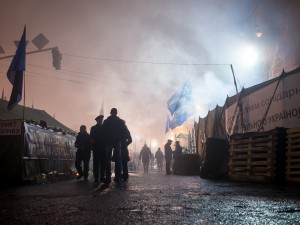 president fled to Russia after being wanted for mass-murder and gave a speech on February 28th from Moscow. Unknown Russian troops entered the Russian speaking part of Ukraine, Crimea which is a southeast peninsula in the Black Sea, monitoring its airport and raised Russian flags to Crimean parliament building. Since then, most of the troops have left having created suspicion of Russia monitoring possible Ukrainian mobilization in Crimea where the new government are least popular.
president fled to Russia after being wanted for mass-murder and gave a speech on February 28th from Moscow. Unknown Russian troops entered the Russian speaking part of Ukraine, Crimea which is a southeast peninsula in the Black Sea, monitoring its airport and raised Russian flags to Crimean parliament building. Since then, most of the troops have left having created suspicion of Russia monitoring possible Ukrainian mobilization in Crimea where the new government are least popular.
What will happen to Ukraine in the following months is hard to predict. A big country, of more than 45million citizens, needs a strong, reliable government but stability requires a fashion of active citizenship to challenge the power of the authorities. According to many scholars, states are built for its population, but in the contemporary liberal economic world, self-interests are the driving forces in today’s politics. This was also be a possibility in Ukraine’s case where Yanukovych strived for more power, undermining the legitimacy of his rule.
Active and educated pioneers, such as Dima, are examples for students and citizens who seek to create an inclusive and participatory political processes and sustainable security methods for post-conflict Ukraine.
By Charlotta Lahnalhati
Image Credit:
Picture 1: streetwrk.com, licensed under CC BY-ND 2.0
Picture 2: Sasha Maksymenko, licensed under CC BY-ND 2.0
